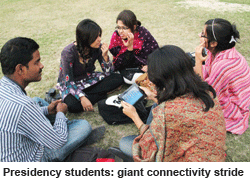To the surprise of academics cynical about the promises of the Mamata Banerjee-led Trinamool Congress government which was swept to power in West Bengal in 2011 ending 34 years of rule of the Communist Party of India (CPM)-led Front government, efforts of the past two years to restore Kolkata’s Presidency University (estb. 1817) to its former status as West Bengal’s pre-eminent institution of higher education, have started showing results.
On December 13, the first e-classroom of the university equipped with a video conferencing unit and bandwidth provided by the National Knowledge Network, was inaugurated with an e-lecture delivered by Dr. Yuri Manin, incumbent professor of mathematics at the Max-Planck-Institut, Bonn (Ger-many). The lecture was not only webcast, it was simultaneously podcast on the university website, allowing the external student community to tune into it. With the inauguration of Presidency’s e-classroom, fully interactive lectures can now be held in tandem with several classrooms worldwide. According to the varsity’s top brass, the e-classroom is a giant stride towards connecting PU with classrooms around the world.
 Restoration of Presidency’s reput-ation and pride prior to its 200th anniversary in 2017 was articulated by chief minister Mamata Banerjee as a top priority, immediately after she was sworn in following the rout of the Left Front which during its 34 years of uninterrupted rule (1977-2011) of West Bengal, ruined the state’s once highly admired education system by packing schools and universities with dogmatic under-qualified teachers and professors. In May 2011, she appointed a ten-member mentor group, headed by reno-wned Harvard academic Prof. Sugata Bose and guided by Nobel Laureate Dr. Amartya Sen, to devise ways and means for the rejuvenation and revival of PU.
Restoration of Presidency’s reput-ation and pride prior to its 200th anniversary in 2017 was articulated by chief minister Mamata Banerjee as a top priority, immediately after she was sworn in following the rout of the Left Front which during its 34 years of uninterrupted rule (1977-2011) of West Bengal, ruined the state’s once highly admired education system by packing schools and universities with dogmatic under-qualified teachers and professors. In May 2011, she appointed a ten-member mentor group, headed by reno-wned Harvard academic Prof. Sugata Bose and guided by Nobel Laureate Dr. Amartya Sen, to devise ways and means for the rejuvenation and revival of PU.
Established in 1817 as Hindu College (it was christened Presidency College in 1855), Presidency was the first college in India to admit women students (1897), and steadily developed into a world class institution by the mid-1960s attracting nationally and internationally renowned faculty, despite abysmal working conditions and low wages paid by the Left Front government. However to the disappointment of Kolkata’s academy, the Trinamool Congress government’s Budget 2012-13 made no provision to fund the proposed make-over. It allocated a measly Rs.240 crore for the state’s 18 universities and 374 colleges, provoking widespread cyni-cism about its proclaimed intent to restore PU to its former glory.
In the circumstances the inauguration of the varsity’s globally connected e-classroom at an estimated cost of Rs.10 lakh has come as a pleasant and unexpected surprise. On December 13, more than 60 students and half a dozen teachers filed into the state-of-the-art class not just to listen to Prof. Manin’s lecture on num-bers, but also to experience an e-classroom for the first time. Later in the evening, the students connected with Russian mathematician Vladimir Voevodsky of Princeton University.
“There are many distinguished Presidency alumni around the world who cannot always travel to PU but are keen to take classes. Dr. Amartya Sen and Prof. Sugata Bose — both alumni of this university — have agreed to connect their classrooms at Harvard with PU. Likewise Dr. Nicholas Roe, a distinguished professor of English at University of St. Andrews, Scotland, has consented to conduct a full course using this technology,” said Dr. Malabika Sarkar, vice chancellor of PU, speaking on the occasion.
Inevitably, the acclaim and excitement generated by PU’s maiden e-classroom is not universal. “Skype, Google Hangout and Zoho Show distance learning programs have been around for years and are being accessed by institutions such as Praxis, IIM-Calcutta and XLRI, Jamshedpur which have been conducting video conferencing-based classes for a long time. This giant step for Presidency is actually a small step for e-learning. Thanks to the internet revolution, TED, Coursera, UDEMY and other MOOCs (massive open online courses), one doesn’t need to toil much to listen to lectures from great profes-sors,” comments Prithwis Mukherjee, program director of business analytics at the Praxis Business School, Kolkata.
Nevertheless given the history of West Bengal’s moribund state govern-ment managed higher education instit-utions, PU’s first e-classroom is a step forward, even if not a technology leap.
Baishali Mukherjee (Kolkata)